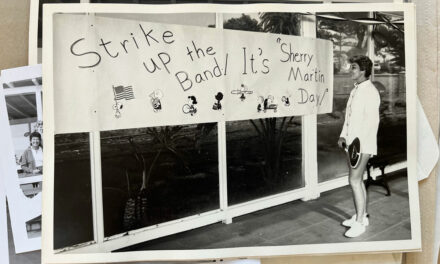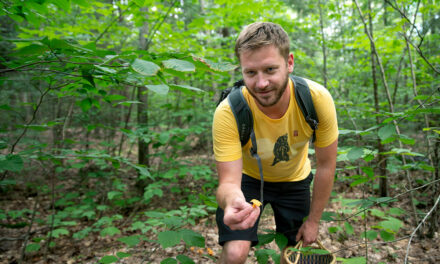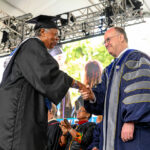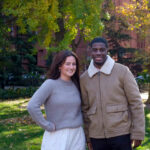
An Episcopal School, Spring 2022
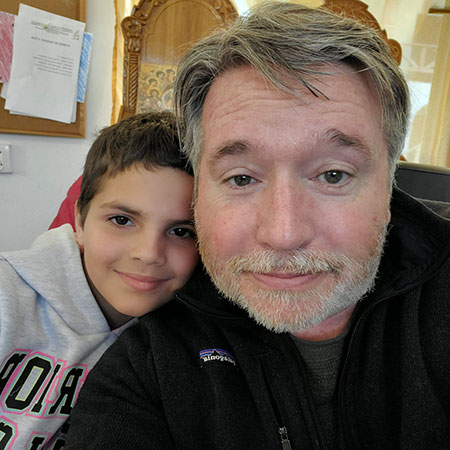
In Aid of God’s Children
By The Rev. Sean Cavanaugh
Head Chaplain
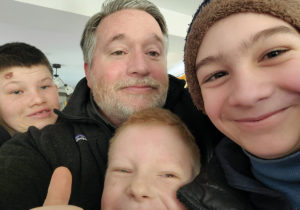
Over spring break, head chaplain, The Rev. Sean Cavanaugh, flew to Romania to help resettle more than 100 Ukrainian refugees who found their way to the Pro Vita community.
“Papa, Papa.” These two simple words came from the voice of a 10-year-old Ukrainian boy that I had the gift and privilege of getting to know during my brief time in Romania during spring break in March. The young boy was calling out to me and using the only words that he knew were recognized in Ukrainian, Romanian, Russian, and English. He was beckoning to me, asking me to spend a few precious minutes of time playing with the soccer ball that he had somehow managed to wrestle away from the other children. “Papa, Papa“ became his crucial connection to me in the midst of so much upheaval and uncertainty in his young life. This scene was echoed and repeated many times with many different young Ukrainian children during my short stay. The time I spent with these incredible children touched me deeply, evoking so many emotions and thoughts. Thoughts and emotions best described as heartbreaking, sacred, hopeful, and angry—angry that these Ukrainian children were not in the Odessa region of Ukraine where they belonged, but instead were in Romania fleeing for their young lives.
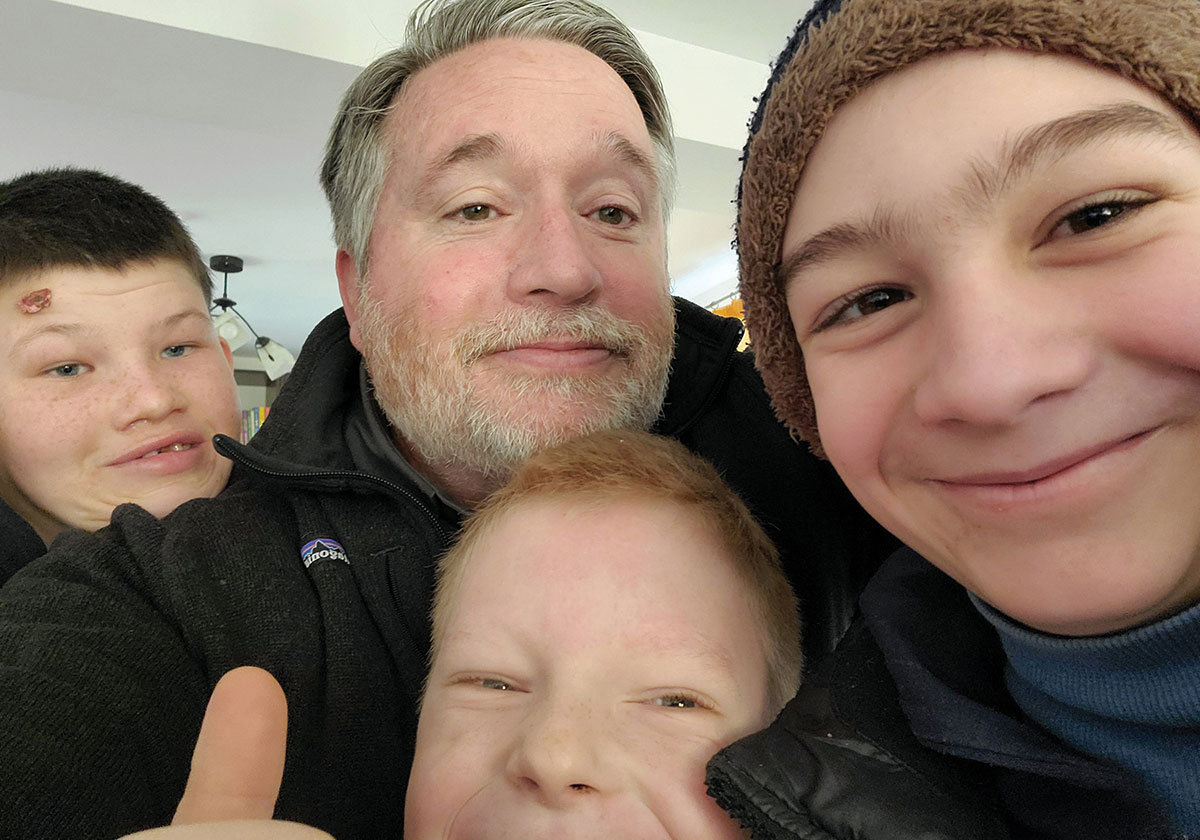
Over spring break, head chaplain, The Rev. Sean Cavanaugh, flew to Romania to help resettle more than 100 Ukrainian refugees who found their way to the Pro Vita community.
“Papa, Papa.” These two simple words came from the voice of a 10-year-old Ukrainian boy that I had the gift and privilege of getting to know during my brief time in Romania during spring break in March. The young boy was calling out to me and using the only words that he knew were recognized in Ukrainian, Romanian, Russian, and English. He was beckoning to me, asking me to spend a few precious minutes of time playing with the soccer ball that he had somehow managed to wrestle away from the other children. “Papa, Papa“ became his crucial connection to me in the midst of so much upheaval and uncertainty in his young life. This scene was echoed and repeated many times with many different young Ukrainian children during my short stay. The time I spent with these incredible children touched me deeply, evoking so many emotions and thoughts. Thoughts and emotions best described as heartbreaking, sacred, hopeful, and angry—angry that these Ukrainian children were not in the Odessa region of Ukraine where they belonged, but instead were in Romania fleeing for their young lives.
This trip to Romania was to help resettle more than 100 Ukrainians refugees taken in by the Pro-Vita community. I have been traveling to Romania and taking St. Stephen’s and St. Agnes students on service trips to work with the extraordinary Pro Vita Orphanage for the last 17 years. I currently chair the American Friends of the Pro Vita Orphanage foundation, which was established with the help of Saints alumnae Ruth Geiger ’09, Paula Trahos ’09, and Shelby Stowers ’08 and Saints parent Merle DeLancey, an attorney who graciously helped with the legal aspects of setting up the foundation as a 501(c) 3 charity (afpvo.org). Most of the trips to Pro Vita have been co-lead by incredible faculty and staff (including current faculty Tim Doyle, Shannon Fusina, Nicole Harding, Rev. Chris Miller, Ashley Stone, and Carl Johnson among others) and attended by hundreds of caring and empathetic students. Pro Vita was created by a Romanian Orthodox priest, Father Tanase, and the community works with marginalized Romanians, both young and old. Perhaps what makes Pro Vita so unique, and why students and faculty keep going back year after year, is that the central mission of this community is rooted in a profound belief that love and grace can overcome much of the world’s brokenness. It’s also a community where Romanians eat, work, share, sleep, and support each other in ways that are counter cultural to Western values.
The Ukrainians at Pro Vita have been forced to flee their country because of the war launched by the Russian government under its leader Vladimir Putin. It was shocking to realize that just six short weeks before I arrived there, the Ukrainians had been going about their everyday lives, attending school, sharing meals together, drinking coffee at their local cafe, and just living life. When I was there, nearly four million Ukrainians had fled the war in search of safety. Tragically, half of the Ukrainians I met at Pro Vita were children who were living in an orphanage near the city of Odessa. In addition to the extra needs these children had before being displaced, none of them spoke any English or Romanian. During my time with these children, there was a fascinating cacophony of Russian, Ukrainian, Romanian, and English being spoken. Google translate was often the only language tool we had to communicate. It was unlike any other experience I have had before.
Although these are very difficult days for Pro Vita, their amazing staff, and the Ukrainians, there is also hope that flows within the walls of this community. Hope that these young Ukrainians will find a way to settle into their new Romanian home and hope that with God’s grace the war will end and they and the rest of the Ukrainians can go home. Although I left Romania with a heavy heart, I am proud of the work that St. Stephens and St. Agnes has done to strengthen the Pro Vita over the last 17 years. As I worked to help resettle these young Ukrainians, my thoughts were also with the Saints community and our mission, our deep belief in goodness, and that it was a privilege to have this opportunity to care for each member of this small Ukrainian community and honor their unique value as children of God.
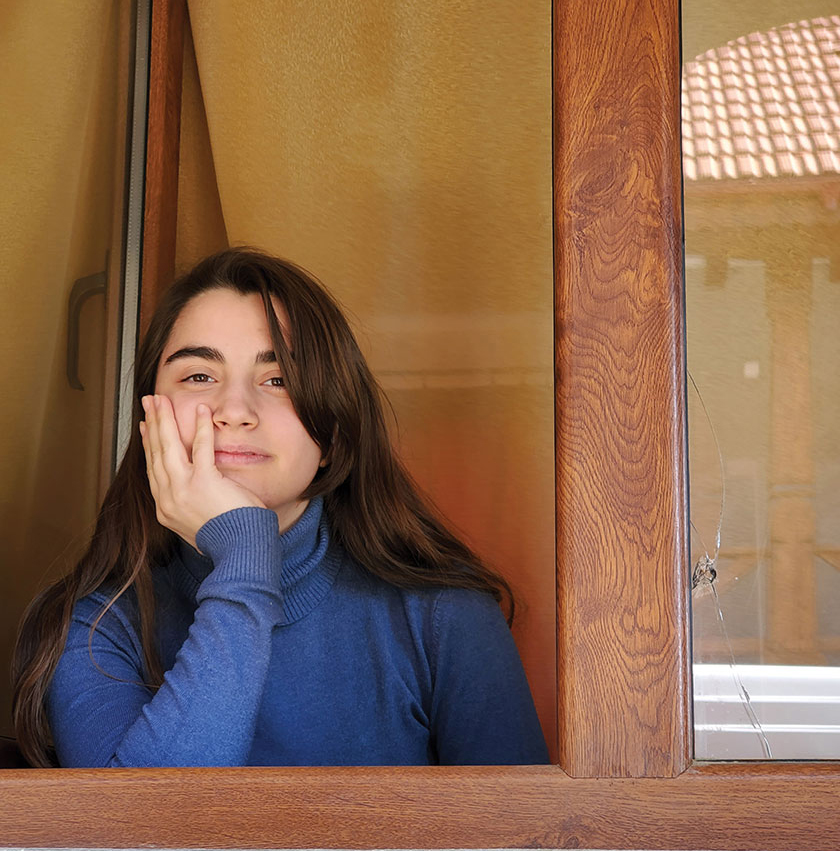
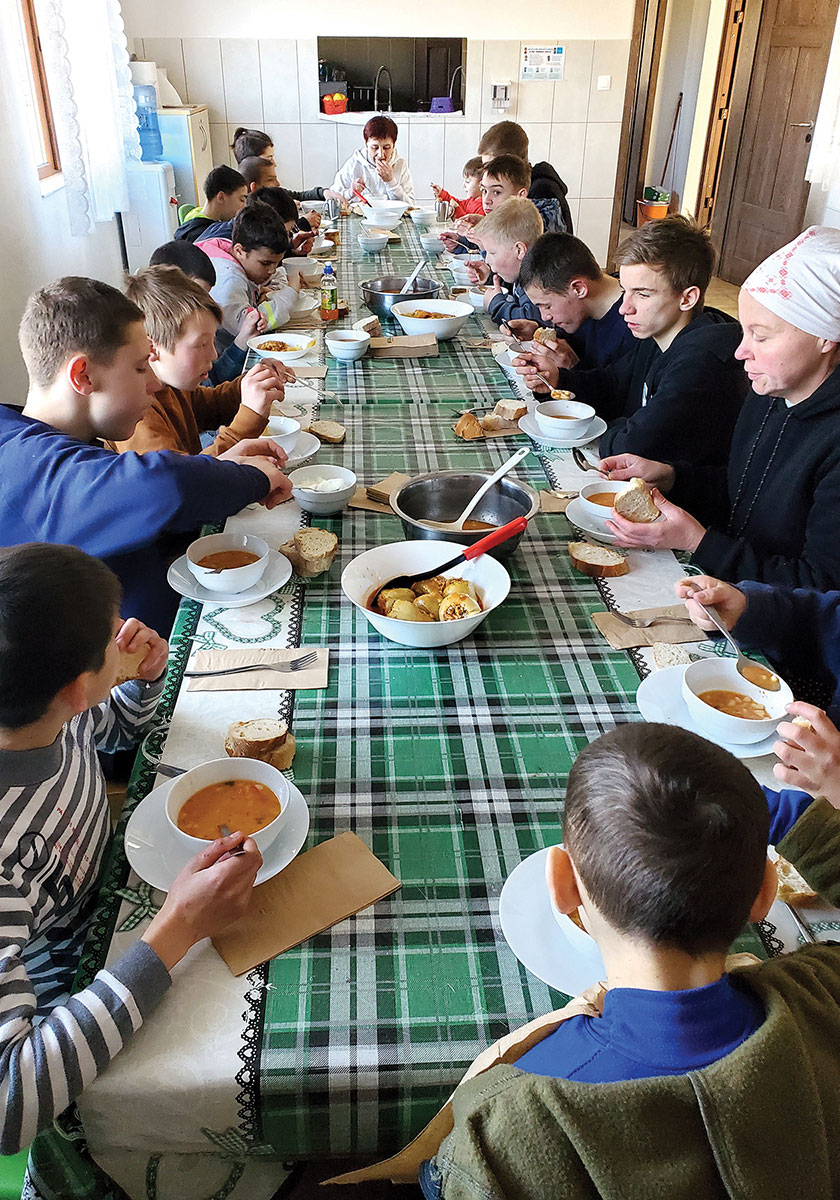
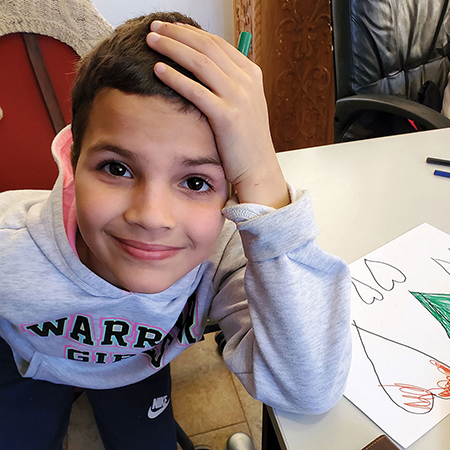
What is My Call in the World?
The Rev. Chris Miller ’05, our Middle School chaplain, gave this homily in chapel on February 1.
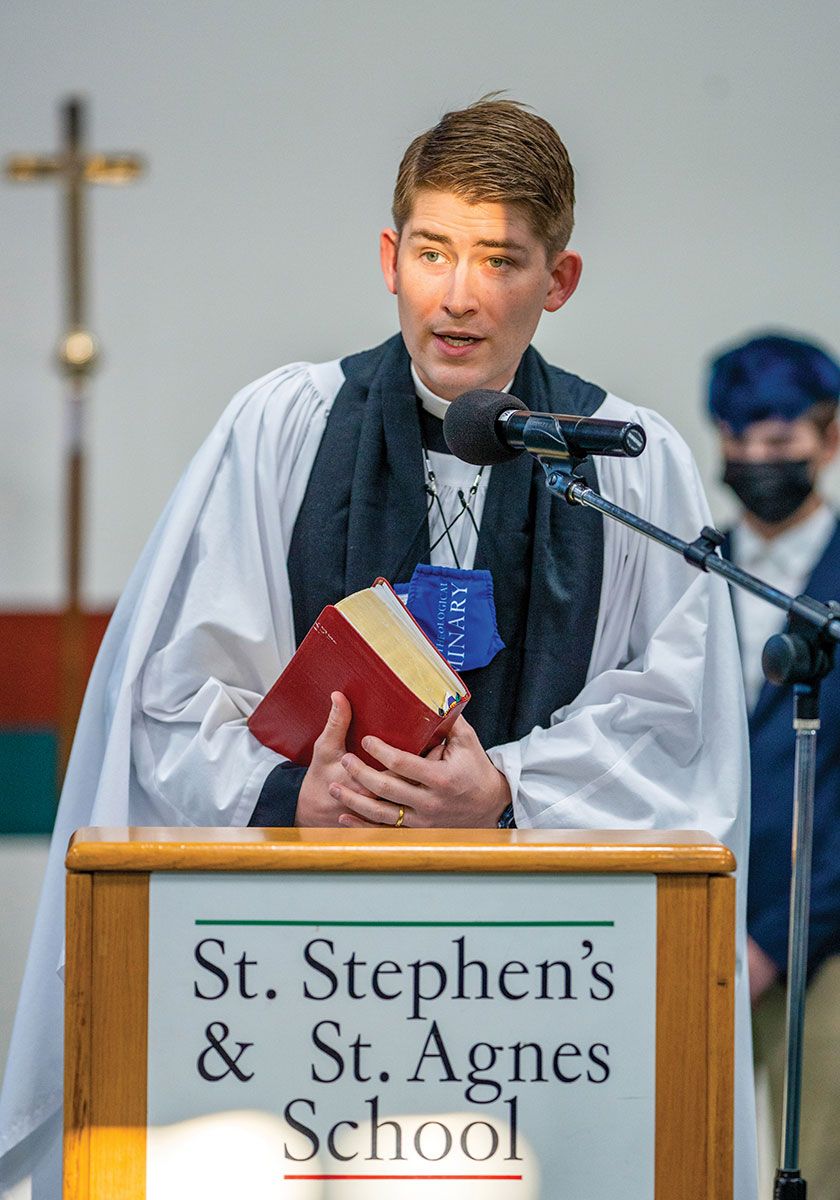
Our text this morning comes from the Prophet Jeremiah: “Before I formed you in the womb I knew you, and before you were born I consecrated you; I appointed you a prophet to the nations.” (Jeremiah 1:5)
Those of you in my eighth grade religion class know that I love children’s stories. I think the way we tend to engage children’s stories—with joy, splendor, wonder, and curiosity—is the best way to approach stories from the Bible.
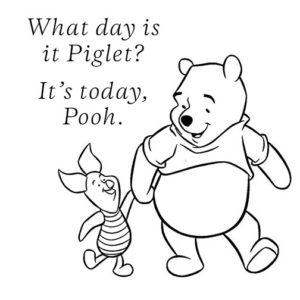 I’ll begin with a brief story from Winnie the Pooh. One day Pooh and Piglet are talking. Pooh turns to Piglet and says, “What day is it, Piglet?” Piglet says, “It’s today, Pooh.” Pooh’s response: “My favorite day.”
I’ll begin with a brief story from Winnie the Pooh. One day Pooh and Piglet are talking. Pooh turns to Piglet and says, “What day is it, Piglet?” Piglet says, “It’s today, Pooh.” Pooh’s response: “My favorite day.”
The beauty of having a “today” mindset is that we can approach today, this day, Tuesday, February 1, as an opportunity. Winnie the Pooh’s favorite day is “today” because today is where Pooh is in the moment. So, let’s enter our text from Jeremiah with a “today” mindset.

How does this text from Jeremiah apply to us in the Middle School today?
In order to understand what Jeremiah is telling us, we have to understand a bit of the context. Jeremiah is a prophet who preached approximately 2,500 years ago. His primary means of communication is not the written word. Jeremiah would have preached to crowds gathered before him. And Jeremiah is speaking specifically to the people of Judah. These people in Judah had reason to lose hope. The people of Judah were soon to be scattered about—they were losing control of their community, their worship, and their territory. They were losing their identity as they had known it up until then. Despair was a common feeling among Jeremiah’s people. So, Jeremiah, affirming the realities of despair, set out to offer words of comfort and hope to bring his people along. What we hear this morning is the call of Jeremiah to be his most authentic self.
Have you ever asked the question, “What is my call in this world?” It might be in the modern form of, “When I grow up, who do I want to be?”
Deep down Biblical call is about much more than one’s profession. Biblical call is about our core identity. At St. Stephen’s and St. Agnes School, we believe that everyone who enters this community is welcome here. We believe that everyone who is a part of this community is a beloved child of God, worthy of our time and commitment, with a unique identity. You are in a stage in life when you are experiencing rapid change. The world around us is changing quickly. You are changing quickly.
Eighth graders, just think how much you have grown intellectually since you arrived at the Middle School two and a half years ago. While the flood waters of change wash over you, think about who you are. Think about the core of your identity.
What is it that you want others to know about you?
What is it that matters to you, above all else?
What is your identity?
When Jeremiah hears God’s call for him to be a prophet, he is told that he was known even before he was in the womb of his mother. When Jeremiah hears God’s call for him to be a prophet, he is told that he was made holy and loved before he was born. And when Jeremiah hears God’s call for him to be a prophet, he is told that the core of his identity is that of a truth telling, hope spreading prophet.
The other day, one of my students rightfully asked to learn a bit more about me. Not the resume stuff but what I might describe as real call stuff. Identity stuff. In a respectful and appropriate way, this peer among you was asking me, “Who are you, Rev. Miller?”
I am a devoted father of two boys—Peter is almost 5 and Andrew just turned 3. These boys bring me tremendous joy. I love them. Right now, I especially love running around with them at the Lower School playground on Sunday afternoons.
I am a devoted husband to my wife, Sarah. Sarah is an Episcopal priest as well. We met in seminary just down the road. She is an extremely gifted preacher who I hope we can one day convince to preach among us.
I am an Episcopal priest. By leading worship services, administering sacraments, and accompanying people through the highs and lows of life, I constantly see the beautiful presence of God. I am most alive when I am with other people journeying through life.
I am a graduate of St. Stephen’s and St. Agnes School. All of you do not need to come back and work at St. Stephen’s and St. Agnes to have as much appreciation as I have for this community. But my presence here among you this day is a testament to my love for this place and its people. St. Stephen’s and St. Agnes School is where I found my identity.
St. Stephen’s and St. Agnes School is not perfect. At its best, though, we are a school community that values individuality within community. We value compassion alongside excellence. And we support each other, most especially, in the unexpected trials and tribulations of life.
My identity would not be what it is today if it weren’t for the teachers and coaches and staff at St. Stephen’s and St. Agnes School who, each in their own way, took time to get to know me and my peers.

